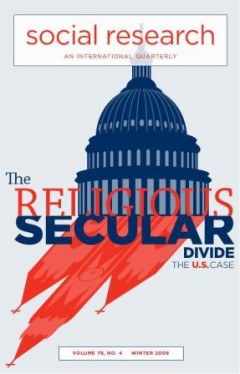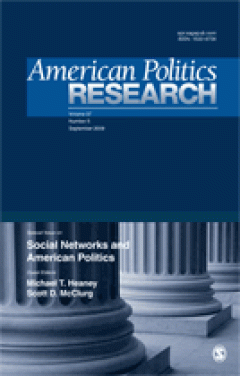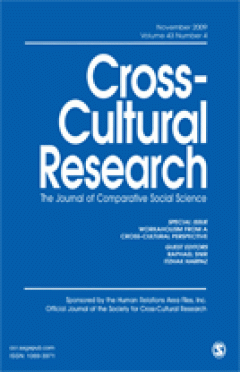Filter by

Jefferson's Rickety Wall: Sacred and Secular in American Politics
From the start, Americans were wrestling with the proper connections between "private and public felicity." On its face, the first line of the First Amendment to the Constitution seems to settle the issue: "Congress shall make no law respecting the establishment of religion or prohibiting the free exercise thereof." Thomas Jefferson declared that this provision "buil[t] a wall of separation bet…
- Edition
- Volume 76, Number 4 Winter 2009 Pages: 1199 - 122
- ISBN/ISSN
- 0037783x
- Collation
- -
- Series Title
- Social Research: An International Quarterly
- Call Number
- -

Obama's Neo-New Deal: Religion, Secularism, and Sex in Political Debates Now
The "religious and secular divide" cannot be understood unless we think about the way sex gets mobilized on both sides of this supposed divide. In our joint writing, we have resisted thinking of the religious and the secular as a divide; we have rather been interested to think them relationally—as relations. Thus, the larger suggestion of this paper is that we cannot truly imagine and practice …
- Edition
- Volume 76, Number 4 Winter 2009 Pages: 1227 - 125
- ISBN/ISSN
- 0037783x
- Collation
- -
- Series Title
- Social Research: An International Quarterly
- Call Number
- -

Introduction: Moral Crusades Then and Now: Religious and Secular
This introduction frames the papers that follow in terms of an overlapping project of recognizing asymmetries and shifts as communities seek to draw lines between church and state, private values and public morality, insiders and outsiders, and reconcilable and irreconcilable differences. The ideas of the religious and secular sometimes fold into each other or split apart to make new alignments…
- Edition
- Volume 76, Number 4 Winter 2009 Pages: 1257 - 126
- ISBN/ISSN
- 0037783x
- Collation
- -
- Series Title
- Social Research: An International Quarterly
- Call Number
- -

Prophetic Religion: A Transracial Challenge to Modern Democracy
Most contributors approach the secularization question out of concern with intolerance and repression. But a peculiar kind of religion may impinge upon secular life in a different way: a prophetic religion may generate the solidarity and will-to-sacrifice that oppressed peoples need to fight for freedom and equality. The tradition of the Hebrew Prophets (shared by Islam and Judaism) played a ke…
- Edition
- Volume 76, Number 4 Winter 2009 Pages: 1261 - 127
- ISBN/ISSN
- 0037783x
- Collation
- -
- Series Title
- Social Research: An International Quarterly
- Call Number
- -

American Protestant Moralism and the Secular Imagination: From Temperance to …
Modern secularity as a historically specific hegemonic social formation that prevailed in the U.S. in the mid-20th century depended on and was, in part, constituted by the exclusion of fundamentalists and their Bible-based moral rhetorics from public life. This essay argues that the movements for temperance, prohibition, and prohibition repeal were an important context in which the political an…
- Edition
- Volume 76, Number 4 Winter 2009 Pages: 1277 - 130
- ISBN/ISSN
- 0037783x
- Collation
- -
- Series Title
- Social Research: An International Quarterly
- Call Number
- -

The Culture War and the Sacred/Secular Divide: The Problem of Pluralism and W…
The culture war over the last several decades in North America appears to be a proxy between the conflict of the sacred and the secular. Yet, this perception ignores the complexity that actually exists. Advocates for competing sides have never denied a place for the other but affirmed the necessity of pluralism in American democracy. Rather, the conflict has been a contest over the language and…
- Edition
- Volume 76, Number 4 Winter 2009 Pages: 1307 - 132
- ISBN/ISSN
- 0037783x
- Collation
- -
- Series Title
- Social Research: An International Quarterly
- Call Number
- -

The Religious-Secular Divide: The U.S. Case
This essay summarizes the themes and issues of the conference and raises further questions concerning how religion and the secular might be theorized and related.
- Edition
- Volume 76, Number 4 Winter 2009 Pages: 1327 - 13
- ISBN/ISSN
- 0037783x
- Collation
- -
- Series Title
- Social Research: An International Quarterly
- Call Number
- -

Reclaiming the Secular and the Religious: The Primacy of Religious Autonomy
What is the "secular"? Is it a state of official neutrality, or is it one in which religious influences are on the wane? This "polysemy" about "the secular" permeates our public and legal discussions and has unfortunate consequences for debates over our constitutional arrangements. In these comments, I will suggest that a different vocabulary—a vocabulary of religious freedom rather than secula…
- Edition
- Volume 76, Number 4 Winter 2009 Pages: 1333 - 13
- ISBN/ISSN
- 0037783x
- Collation
- -
- Series Title
- Social Research: An International Quarterly
- Call Number
- -

Religion, Secularism, and a Democratic Politics of "As If"
"The religious" and "the secular" are often posed as a divide; a narrative which poses religion and secularism as antagonists. This long-standing habit of thought remains active in the contemporary United States, polarizing public debates and generating misunderstanding. Are there other ways of talking about and enacting the relations between "religion" and "secularism" that can avoid balkaniza…
- Edition
- Volume 76, Number 4 Winter 2009 Pages: 1345 - 1350
- ISBN/ISSN
- 0037783x
- Collation
- -
- Series Title
- Social Research: An International Quarterly
- Call Number
- -

Money and State Legislative Elections: The Conditional Impact of Political Co…
This study builds on existing literature demonstrating the conditional effects of contextual and conversion factors on the relationship between money and votes in state legislative elections. A conditional theory of the impact of spending in state legislative campaigns is developed, emphasizing that the effectiveness of expenditures should vary according to the number of “up for grabs” voters i…
- Edition
- Vol. 38 no. 3 May 2010 pp. 399-424
- ISBN/ISSN
- 1532673x
- Collation
- -
- Series Title
- American Politics Research
- Call Number
- -

Mobilizing the Mobilized: The Electoral Recruitment Paradox
The campaign mobilization literature argues that contacting will have the most influence on individuals who are socioeconomically or politically disadvantaged. Yet evidence persistently shows that the advantaged are disproportionately contacted. This paradox is explained once one recognizes that contacting during elections serves divergent goals that are tied to the election cycle and to electi…
- Edition
- Vol. 38 no. 3 May 2010 pp. 425-442
- ISBN/ISSN
- 1532673x
- Collation
- -
- Series Title
- American Politics Research
- Call Number
- -

Deracializing Obama: White Voters and the 2004 Illinois U.S. Senate Race
Using the unique circumstances of the 2004 Illinois U.S. Senate election, we report findings from survey data from a probability sample of White voters conducted in Illinois during the course of the 2004 election. In an experimental manipulation embedded in the survey, we tested four distinctive framings of Barack Obama by systematically altering the degree and content of his racialization as a…
- Edition
- Vol. 38 no. 3 May 2010 pp. 443-470
- ISBN/ISSN
- 1532673x
- Collation
- -
- Series Title
- American Politics Research
- Call Number
- -

Racial Environment and Political Participation
How does the racial environment influence mass political participation? The power—threat hypothesis predicts that a larger out-group population in the surrounding environment increases citizen participation, whereas the relational goods hypothesis predicts that it decreases participation. I attempt to reconcile these conflicting arguments into a single hypothesis positing that citizens’ decisio…
- Edition
- Vol. 38 no. 3 May 2010 pp. 471-501
- ISBN/ISSN
- 1532673x
- Collation
- -
- Series Title
- American Politics Research
- Call Number
- -

Do Voters Perceive Negative Campaigns as Informative Campaigns?
We argue that citizens distinguish the tone of a campaign from the quality of information that it provides and that evaluations on each dimension respond differently to positive and negative political advertising. We test these claims using survey and advertising data from the 2000 presidential campaign and two 1998 gubernatorial races. In each race, citizens separate judgments about the tone o…
- Edition
- Vol. 38 no. 3 May 2010 pp. 502-530
- ISBN/ISSN
- 1532673x
- Collation
- -
- Series Title
- American Politics Research
- Call Number
- -

Black-Latino Political Relationships: Policy Voting in the U.S. House of Repr…
Political relations between racial/ethnic groups in America have (a) been commonly examined in terms of the degree of “cooperation” or “conflict” and (b) have most frequently been studied in the arena of urban politics; this has been especially so in the case of Hispanics/Latinos and African Americans. This article represents the first effort to pose and to systematically assess the question of…
- Edition
- Vol. 38 no. 3 May 2010 pp. 531-562
- ISBN/ISSN
- 1532673x
- Collation
- -
- Series Title
- American Politics Research
- Call Number
- -

Candidate Quality and the Election of Republican Governors in the South, 1950…
Following the Civil War, the Democratic Party enjoyed almost complete dominance in southern electoral politics. Democratic hegemony was particularly acute in gubernatorial elections: In most southern states, more than a century elapsed before the first Republican governor was elected. Gubernatorial electoral success is a fundamental question, given the prominence of governors in state politics …
- Edition
- Vol. 38 no. 3 May 2010 pp. 563-585
- ISBN/ISSN
- 1532673x
- Collation
- -
- Series Title
- American Politics Research
- Call Number
- -

Evolutionary Perspectives on Workplace Gossip: Why and How Gossip Can Serve G…
Gossip in the workplace has generally been ignored by researchers and often criticized by practitioners. The authors apply a transdisciplinary evolutionary approach to argue that gossip is a natural part of social organizations and that certain conditions can encourage socially-redeeming gossip. They draw on case studies involving cattle ranchers, members of a competitive rowing team, and airli…
- Edition
- Vol. 35 no. 2 April 2010 pp. 150-176
- ISBN/ISSN
- 10596011
- Collation
- -
- Series Title
- Group Organization Management
- Call Number
- -

A Social Network Analysis of Positive and Negative Gossip in Organizational Life
The authors use social network analysis to understand how employees’ propensity to engage in positive and negative gossip is driven by their underlying relationship ties.They find that expressive friendship ties between employees are positively related to engaging in both positive and negative gossip, whereas instrumental workflow ties, which are less trusting than friendship ties, are related …
- Edition
- Vol. 35 no. 2 April 2010 pp. 177-212
- ISBN/ISSN
- 10596011
- Collation
- -
- Series Title
- Group Organization Management
- Call Number
- -

Experiencing Gossip: The Foundations for a Theory of Embedded Organizational …
This article presents findings on the nature and operation of gossip that emerged from an empirical study of organizational communication during a chief executive officer (CEO) succession process. By studying gossip within the context of a broader study of change-related communication, new insights were gained that extend, and in some respects challenge, commonly accepted views of the nature of…
- Edition
- Vol. 35 no. 2 April 2010 pp. 213-240
- ISBN/ISSN
- 10596011
- Collation
- -
- Series Title
- Group Organization Management
- Call Number
- -

Perceived Teacher Acceptance, Parental Acceptance, and the Adjustment, Achiev…
Drawing stimulus from parental acceptance-rejection theory (PARTheory) and associated measures, articles in this special issue attempt to assess the relative contribution of perceived teacher and parental (maternal and paternal) acceptance and behavioral control to the psychological adjustment, school conduct, and academic achievement of school-going youths (boys and girls) within six nations c…
- Edition
- Vol. 44 no. 3 August 2010 pp. 211-221
- ISBN/ISSN
- 10693971
- Collation
- -
- Series Title
- Cross-Cultural Research
- Call Number
- -
 Computer Science, Information & General Works
Computer Science, Information & General Works  Philosophy & Psychology
Philosophy & Psychology  Religion
Religion  Social Sciences
Social Sciences  Language
Language  Pure Science
Pure Science  Applied Sciences
Applied Sciences  Art & Recreation
Art & Recreation  Literature
Literature  History & Geography
History & Geography